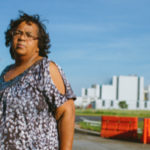By David A. Love | ecoWURD Contributor
Climate change and environmental issues are impacting the Black community in a disproportionate fashion, a reality which gave birth to the environmental justice movement. Despite the increased importance of environmental issues in Black America — with a heightened level of consciousness on climate issues and African Americans taking a central role in that movement — much of the Black media does not or won’t cover the environment.
In Philadelphia, WURD radio – the only Black talk radio station in the large state of Pennsylvania, and one of a few independently-owned Black talk stations in the nation – launched the ambitious ‘ecoWURD’ project covering the intersection of the environment, race and income. That’s culminated into a series of high-profile public events and heightened conversation on WURD that’s unlike any other Black radio station anywhere. Hence, ecoWURD is one of the more robust Black media efforts known covering environmental justice, climate and pollution issues from an entirely Black perspective. “I don’t know any other outlet like this, no other Black outlet, putting in this much effort and dedicated resources on environmental issues,” longtime environmental advocate and founder of eco-Diversity Noemi Lujan Perez tells ecoWURD.
But, even as Philly faces an onslaught of severe air quality, water quality and related public health issues disproportionately hitting Black Philadelphians, it’s still hit or miss. When reaching out to the Philadelphia Tribune, the largest and oldest daily Black newspaper in the country, there was no response to requests for comment. A search online found that over the years, however, the near-daily has had 23 articles on environmental racism, 80 on environmental justice, over 200 on Flint and the Flint water crisis and 758 on climate change.
Elsewhere, in places like Minneapolis-St. Paul, where there are large Black populations dealing with environmental challenges, the record can be spotty. The Minnesota Spokesman-Recorder once devoted more space to environmental matters, but for the state’s leading voice among the Black Press for 85 years, it all comes down to limited resources.
Jerry Freeman, MSR senior editor, told ecoWURD that the paper until recently ran a biweekly page covering green topics and climate change. “We discontinued that page for two primary reasons: 1) difficulty finding content specifically related to environmental issues affecting Black communities and other communities of color, which often differ from the issues affecting White communities, and 2) difficulty finding advertisers and/or sponsors for the page’s layout/printing costs and creating our own copy as best we were able,” Freeman said. “We would consider reviving the page if we had the ads/sponsorship to support it and if we could find or create copy suited to our readership.” I think we should start with Philadelphia vs. Minnesota. Since our focus is Philadelphia we should be talking with Black media stakeholders closer to home examining how they cover environmental justice.
Black communities nationally are not only very aware of issues related to the environment and climate change (a term that is gradually evolving into “climate crisis”), they are also very concerned. While a solid half of the American public says they have “personally felt the effects of climate change,” according to an August Economist/YouGov poll, about 56 percent of African American voters claim they have – the highest rate of affirmative response on that question from all demographic groups surveyed. Nearly 75 percent of Black respondents surveyed expressed that they were either “very concerned” or “somewhat concerned” about climate change, compared to 66 percent of Whites and a similar number of Latinos. And African Americans – at 62 percent response – were the most likely demographic to believe that the “severity” of hotter summers (this past July being the hottest ever recorded) is the direct result of climate change.
In that same poll, environment (11 percent) also ranks as a top five issue for Black respondents – along with the economy (14 percent), education (11 percent), health care (18 percent) and Social Security (17 percent).
Still, for a variety of reasons attributed to lack of resources and internal decision-making processes, Black media outlets by-and-large are not covering the environment or related issues in any concerted way. “We do not report much on environmental issues and climate change,” Patreice A. Massey, Managing Editor of the Michigan Chronicle told ecoWURD. “The environmental stories that we have covered have been things like the Flint water crisis. Environmental and climate change issues tend to be complex and we don’t have the resources to cover such issues in a way that would do it justice. Also, our readership engages more with community centered stories with a face.”
Similarly, publications such as the African American Voice in Colorado do not report on the environment, while the topic does not fit the format of many Black radio stations. “We are a music station and have limited discussions on environmental topics,” said Karen E. Slade, Vice President and General Manager of KJLH Radio FM in Inglewood, California.
Meanwhile, some Black news outlets take a different approach. For example, the St. Louis American covers the environment steadily, according to Chris King, editorial director of the newspaper.
“We cover green issues as they come up. Like a few years back we did a series on climate change-based gentrification in Miami. We also closely cover Flint and its water issues. We feel that covering the environment is important, as black people are often deeply affected by it,” Danielle Belton, editor-in-chief of The Root told ecoWURD that “it’s an impactful story we have to stay on top of as African Americans are disproportionately affected by environment ills—from living in flood-prone areas to the high rate of asthma.”
“It’s just crucial that we talk about these issues.”
Atlanta Black Star, which has extensive coverage of environmental justice matters. For example, a search on “environmental justice” yields over 100 articles, with 80 stories on environmental racism, 73 on the Flint water crisis, and 24 on climate change. Similarly, theGrio has published 232 climate change stories, 122 environmental justice stories, 85 articles on Flint and 49 on environmental racism. BlackPressUSA, which is a website of the National Newspaper Publishers Association (NNPA), and NewsOne also feature some articles on environmental racism.
It may depend greatly on the region and the priorities of a specific community. A few regional and local Black newspapers and magazines, for example, stand out in their in-depth treatment of green issues. One of those is the North Dallas Gazette. “Environmental racism is definitely on the radar in the Dallas community,” said Ruth Ferguson, Editor of the Gazette, a longstanding Black newspaper in Texas. Ferguson noted that while the African American community has dealt with more kitchen table issues in the past, it is getting to the point where it cannot afford to ignore climate change. Ferguson pointed to the problem of flash floods and the recent flooding of the First Baptist Church. “We have a church, not an African American church, that has been flooded twice after 50 years, and this is twice only in the last week,” Ferguson said.
“There was a situation with Shingle Mountain, an African American woman in the southern sector of Dallas,” Ferguson added. “A recycling company was illegally dumping shingles to the point it literally, next to a mountain. It took her raising a ruckus to the point where the city took the company to court and the company lost its permit.”
Ferguson views “environmental injustice” as a buzzword rising on the radar of the African American community, and that’s definitely been the case in 2019. “They are becoming more sensitized that they can receive the short end of the environmental stick. Millennials are far more aware of environmental issues and I think that is leading to change.”
Oil is a big player in Texas. Ferguson noted that while Exxon is based in the Dallas area, environmental discussions regarding oil take place more in the Houston area, where offshore oil rigs are located. Other debates are taking place over the planned high-speed rail to connect Austin, Dallas and Houston, in which concerns over land rights and the environment are front and center. Fracking, and the unprecedented earthquakes resulting from it, are also triggering Black residents into concern and action. While industry insisted the earthquakes were not related to the fracking, many in the community believed otherwise. “In 2015 there were quite a few earthquakes, they were shocking to us,” Ferguson added.
Slowly and for quite some time, the North Dallas Gazette seems like an exception to the rule. If has introduced environmental content to its readership, which began to resonate with readers in recent years. One of those issues is the intersection of environmental justice and gentrification. “West Dallas has been revitalized a great deal, but it came about from the federal government requiring them to clean up the lead. It was primarily an African American neighborhood, but you’re starting to see gentrification.”
Another Black publication in tune with environmental justice is BLAC Detroit Magazine, whose May cover story, entitled “A Look at Climate Change and Why Black People Will Be Among the Hardest Hit,” brought the issue home for poor communities and communities of color in the Motor City.
“I wanted to address climate change because the issue has become so politicized, and almost sound bite-y, that people are starting to tune out. Our people, specifically, have so much to deal with economically and socially, and something like the issue of climate change, at first glance, can seem so broad and so far away in comparison to day-to-day issues that it may seem like a non-priority,” Paris Giles, Senior Editor at BLAC Detroit Magazine told ecoWURD. “If you don’t know better, it feels like a high-brow issue. But, actually, scientists and other experts will tell you that it will be poor communities and communities of color that will be hit hardest. It’s already happening, what with deadly heat waves, poisoned water and poor air quality. Our goal at BLAC was to highlight these issues and the people working to make change, and remind the community that climate change is something to care about and talk about.”
Environmental justice is not going away but is growing, and the Black community finds itself in the middle of it. But how are Black news media responding? Neither the National Newspaper Publishers Association (NNPA), the trade association representing Black newspapers throughout the nation, or the National Association of Black Journalists (NABJ) responded to requests from ecoWURD to comment on the importance of environmental issues in Black reporting. Yet, for years, the Black press have shed light on problems that the rest of society has ignored. Many Black publications, news outlets and media organizations have not touched the issue, while some have reported on it and a few have covered it in depth. In the coming years, the demand for more green reporting will only grow. But will the Black press rise to the occasion?



